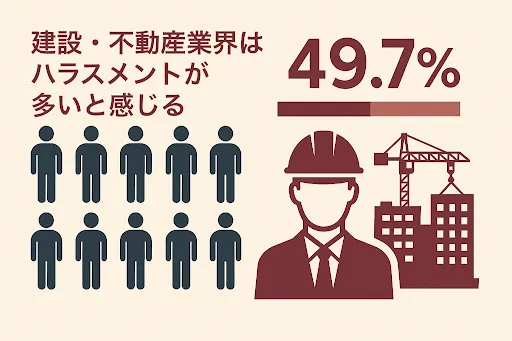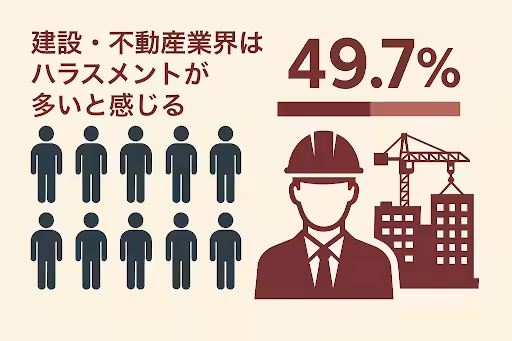

High Harassment Rates in Construction and Real Estate Industries Prompting New Initiatives
Prevalence of Harassment in the Construction and Real Estate Industry
A recent survey by the Risk Communication Institute of Japan (RCIJ), conducted in June 2025 with 322 respondents aged between 20 and 60 nationwide, has unveiled shocking statistics regarding workplace harassment perceptions specifically within the construction and real estate sectors. The findings indicate that a staggering 49.7% of individuals believe that harassment is more prevalent in this domain compared to other industries, marking the highest percentage across the board.
Key Findings of the Survey
The survey results revealed that participants identified various types of harassment they associate with the industry. An overwhelming 74.8% pointed to power harassment as a major concern, while others noted gender harassment at 41.3% and sexual harassment at 34.2%. Moreover, 32.3% of respondents regarded the construction and real estate industry as lacking diversity, further emphasizing the prevailing issues of outdated hierarchical attitudes and behaviors that have long been tolerated in the workplace.
Comparison with Other Industries
In comparison to the construction and real estate sector, other industries also scored high on harassment concerns:
- - Food and Accommodation Services: 46.0% reported high levels of harassment.
- - Healthcare and Welfare: 44.7% felt similar.
- - Education Sector: 34.2% indicated high harassment incidents as well.
The industry’s reputation is further perpetuated by media portrayals. A significant 29.2% of participants attribute their negative perceptions to news from television and newspapers, while social media accounts for 23.0%. This suggests that external narratives play a substantial role in shaping public opinion about these industries.
The Workplace Image of Construction and Real Estate
The survey also highlighted dominant stereotypes associated with the construction and real estate sectors:
- - Strict Hierarchical Structures: 54.0% perceive a military-style atmosphere.
- - Male-Dominated Environment: 48.1% believe that women struggle to thrive in this industry.
- - 3K Image: 49.7% align the industry with being tough, dirty, and dangerous.
- - Long Working Hours: 41.6% confirm extended labor periods are common.
Expert Insights
Haruko Ohsugi, the executive director of RCIJ, articulates some background on these findings: "Long-standing traditions, such as 'it’s always been done this way,' can unknowingly surface as risks. Being cognizant of how an organization appears from the outside can alter how they prepare and protect themselves from criticism."
Upcoming Initiatives
In response to these concerning findings, RCIJ is organizing a participatory workshop titled 'Workplace Compliance and Corporate Responsibility: Addressing Internal Whistleblowing and Harassment' for management personnel in the construction and real estate industry. This practical session, scheduled for July 16, 2025, in Akasaka, Tokyo, will guide attendees on handling risks such as harassment, internal whistleblowing, and social media responses through real-life case studies.
Event Details:
Date: July 16, 2025
Time: 17:00 - 19:00
Location: Akasaka Garden City, 4-15-1 Akasaka, Minato-ku, Tokyo
Target Audience: Management positions in planning, HR, and PR within the construction and real estate industry
For further details or to register, please visit this link.
About RCIJ
The Risk Communication Institute of Japan (RCIJ) stands as the only institution in Japan dedicated to developing specialized curricula focused on risk management in strategic communications. RCIJ unites experts from various industries to deliver comprehensive programs addressing risk management, crisis response, and public relations.
For inquiries, contact:
RCIJ Secretariat
Email: [email protected]
Official website: RCIJ
Certification Courses: Qualifications
Twitter: @rcijofficial

Topics People & Culture)










【About Using Articles】
You can freely use the title and article content by linking to the page where the article is posted.
※ Images cannot be used.
【About Links】
Links are free to use.